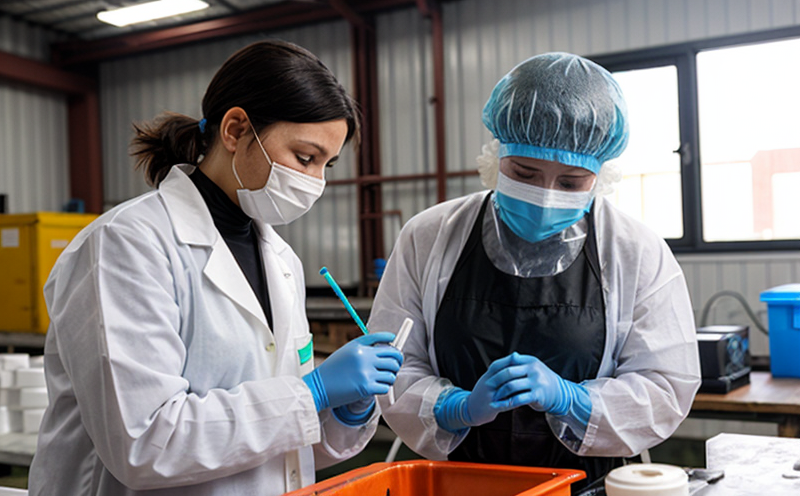ISO 22196 Antimicrobial Activity of Recycled Plastics with Nanomaterials
The ISO 22196 standard is pivotal for the evaluation and certification of antimicrobial activity in materials, especially those used in recycled plastics containing nanomaterials. This service focuses on ensuring that recycled nanomaterials incorporated into plastic products exhibit effective antibacterial properties as defined by this international standard.
The application of nanotechnology to enhance the functional properties of recycled plastics is gaining significant traction due to its sustainability benefits and performance improvements. However, to ensure compliance with regulatory standards and to meet market expectations for hygiene, it is crucial that these products undergo rigorous testing. Our ISO 22196 compliance service ensures that your recycled plastic products containing nanomaterials are evaluated against the stringent criteria set by this standard.
The test involves exposing the material to a standardized bacterial challenge and measuring the extent of microbial inactivation within specified time frames. This process allows for accurate determination of the antimicrobial efficacy, which is critical for product safety and effectiveness.
Our laboratory adheres strictly to ISO 22196 guidelines ensuring that our testing protocols are both precise and repeatable. We use state-of-the-art equipment calibrated according to international standards to guarantee reliable results. The robustness of the test also provides confidence in the long-term performance of your products, particularly in high-hygiene environments such as healthcare facilities, food processing plants, and consumer goods.
Understanding the nuances of this standard is essential for quality managers, compliance officers, R&D engineers, and procurement specialists. By leveraging our expertise, you can ensure that your products not only meet but exceed regulatory requirements while maintaining a high level of hygiene and safety.
Why It Matters
- Ensures compliance with international standards for antimicrobial efficacy in recycled plastics containing nanomaterials.
- Enhances product safety and effectiveness, particularly in high-hygiene environments.
- Safeguards consumer health by verifying the integrity of your products against microbial challenges.
- Promotes trust with regulatory bodies and consumers by demonstrating adherence to rigorous testing protocols.
The importance of this service cannot be overstated, especially in industries where hygiene is paramount. By adhering to ISO 22196, you not only meet legal requirements but also enhance your brand reputation and customer trust.
Scope and Methodology
| Test Parameters | Methodology |
|---|---|
| Bacterial Challenge | Standardized bacterial strains are used to challenge the sample. |
| Incubation Periods | Multiple time points are assessed for microbial inactivation. |
| Sample Preparation | The material is prepared according to ISO 22196 specifications. |
| Data Collection | Microbial counts are recorded at specified intervals post-challenge. |
The methodology for testing under ISO 22196 involves a series of steps designed to accurately assess the antimicrobial activity. The bacterial challenge is crucial, ensuring that the sample is exposed to conditions simulating real-world use. Incubation periods allow for observation at multiple points in time, providing comprehensive data on microbial inactivation.
Sample preparation must be meticulous to ensure consistent and reliable results. Calibration of equipment according to ISO standards ensures precision and repeatability. Data collection is vital for interpreting the effectiveness of the antimicrobial properties of your recycled plastics containing nanomaterials.
Use Cases and Application Examples
- Incorporation of silver or copper-based nanomaterials into recycled plastic products to enhance hygiene.
- Manufacturing medical devices from recycled plastics with antimicrobial additives for use in healthcare settings.
- Production of food packaging from recycled materials containing nanosilver for extended shelf life and safety.
In the manufacturing of medical devices, such as catheters or surgical instruments, incorporating silver-based nanomaterials into recycled plastics can significantly reduce the risk of infection. This is especially important in healthcare settings where hygiene standards are stringent.
Food packaging made from recycled plastic with copper nanomaterials can help extend shelf life and ensure food safety by inhibiting bacterial growth, thus reducing spoilage rates and enhancing consumer health.





